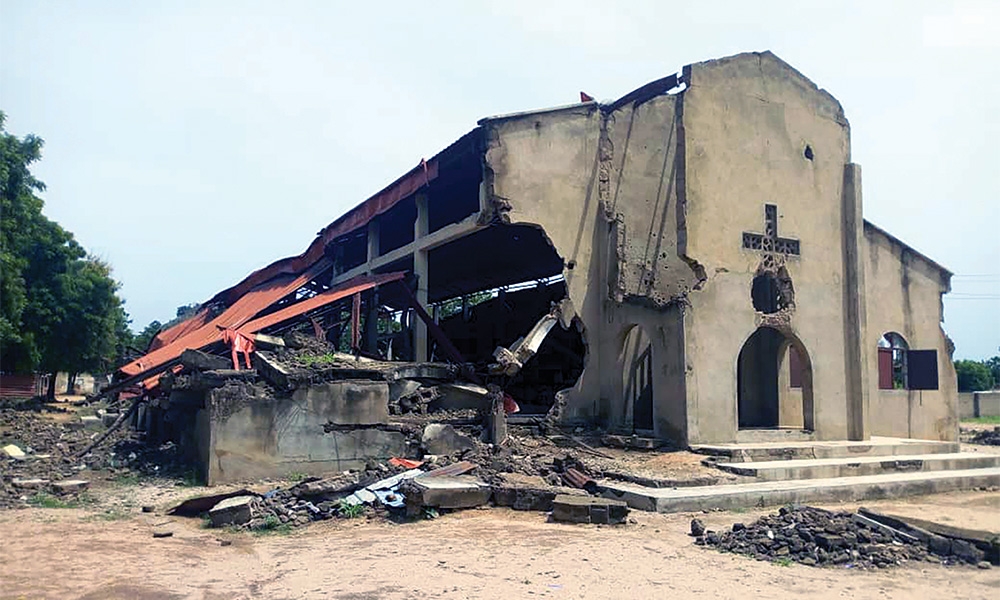
‘The light of Christ prevails over the darkness of the evil one’
Mission Cooperative Plan Appeal
Mission Cooperative Plan Appeal
Father Emmanuel Finbarr, a priest serving in the Diocese of Gaylord in Michigan and a good friend to Bishop Steven Raica, is a native of Nigeria. As the Diocese of Birmingham prepares to hold the Mission Cooperative Plan (MCP) Appeal on June 22-23 , Father Finbarr agreed to share his firsthand insight into how a diocese benefits from MCP.
Father Emmanuel Finbarr, a priest serving in the Diocese of Gaylord in Michigan and a good friend to Bishop Steven Raica, is a native of Nigeria. As the Diocese of Birmingham prepares to hold the Mission Cooperative Plan (MCP) Appeal on June 22-23 , Father Finbarr agreed to share his firsthand insight into how a diocese benefits from MCP.
Father Finbarr is a priest of the Maiduguri Diocese, which is located in the northeastern part of Nigeria. The diocese was created in 1966 and is currently led by Bishop Oliver Doeme Dashe, the fourth bishop of Maiduguri. With the northern part of Nigeria being predominantly Muslim, Catholics in the diocese only account for 3.1 percent of the population. Sadly, this reality has resulted in systemic Christian persecutions and exclusions from socioeconomic, political, and educational spheres. However, the faith, says Father Finbarr, remains unshaken.
The persecution reached fever pitch on July 26, 2009, when Boko Haram, a fanatical Muslim terrorist group, launched an attack on both government structures and Christian churches and properties “to destroy the lives and properties of those who did not share in their faith.”
As pastor of St. Joseph’s Catholic Parish in Gamboru Ngala, Father Finbarr came face-to-face with the violence. “The major seminarian, the parish steward, and I,” he recalls, “narrowly escaped through the windows of the rectory before the terrorists could reach where we lived.” In the capital city of Maiduguri, bombs were detonated in places of Christian worship, including the Cathedral, its rectory, and the bishop’s office. Needless to say, life for Christians became very difficult.
For years the chaos continued until September of 2014 when Boko Haram took things to another level, orchestrating attacks on churches all across the northeastern part of the country. Millions were displaced and over 30,000 lost their lives. Almost 2,000 women and girls were abducted, some of whom were forcefully taken as wives by the terrorists. More than 7,000 women became widows, and about 12,000 children became orphans. Convents, schools, and hospitals were destroyed. Priests fled to neighboring dioceses. “The conflict brought about so much devastation, grief, and severe consequences in the lives of people,” remarks Father Finbarr. “It has broken social values, religious and spiritual cohesion, harmonious relations, and the resilience of people and communities, requiring some attention to meet the physical, psychological, and social wounds of the people.”
Despite the many ordeals, Father Finbarr notes that the expression of faith by the people has been “overwhelming” and continues to grow. Having gone through very dark times, by the end of 2018, “the light of Christ began to shine in the Diocese of Maiduguri.” Many displaced persons were able to return home, bringing great hope to the broken parishes. Rebuilding of the diocese and supporting the needs of the widows and orphans became the primary focus. Churches and schools needed to be reconstructed, clean water needed to be provided, and food needed to be secured.
The tasks were great, and the diocese needed help. After some consideration, the diocese decided to seek assistance from Catholics around the world through the Mission Cooperative Plan. For the past three years, the faithful of the Diocese of Birmingham have assisted the Diocese of Maiduguri and others through their generosity. “We cannot thank the Diocese of Birmingham enough,” says Father Finbarr. “May God, who gave all of you the opportunity to help us in this moment of need, reward your generosity with His blessings. As a diocese, we promise to keep you all in our prayers.”
Missionary Cooperation Plan Appeal
June 22-23, 2024
One of the diocesan efforts to promote mission awareness and spiritual union with mission efforts is the diocesan Missionary Cooperation Plan (MCP). Because of the many needs of new churches in underdeveloped countries — needs that are as urgent today as in any other period in history — each diocese in the United States selects missionary dioceses, religious congregations, or lay missionary organizations to support.
Locally, the support of missionary groups is coordinated by Father Raymond J. Remke, diocesan director of the Society for the Propagation of the Faith, with the endorsement of Bishop Raica.
Through the generous self-giving of many faithful throughout the diocese, these missionary dioceses and other evangelizing groups receive help to support their ongoing work in sharing the Gospel through various projects. For example, past funds that have been raised in the diocese have gone to help in a variety of ways from the construction of school structures, bathroom facilities, and water wells to the payment of teacher salaries and tuition for seminarians. Due to the desperate situation that some of these dioceses face, every dollar given is extremely important.
No amount is too small to make an enormous difference in the lives of others. All funds collected through the appeal are sent directly to the chosen missionary groups. This year’s appeal, which will take place the weekend of June 22-23, will support the projects of the Diocese of Aguascalientes in Mexico, the Diocese of Irinjalakuda in India, the Diocese of Kumba in Cameroon, the Diocese of Maiduguri in Nigeria, the Diocese of Matagalpa in Nicaragua, and the Diocese of Warangal in India.
